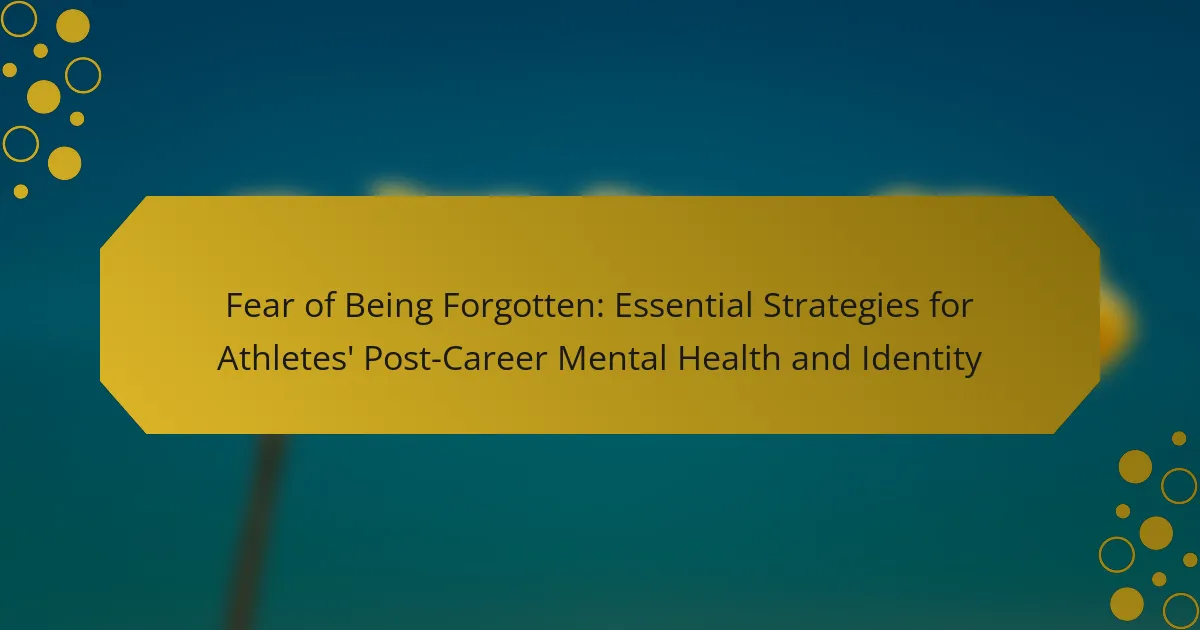Retirement can trigger significant anxiety in athletes, particularly the fear of being forgotten. To navigate this transition, athletes should build a strong support network, engage in new interests, and seek professional guidance. Community involvement and mentorship opportunities can reinforce their identity and legacy beyond sports. Tailored mental health resources are essential to address the unique challenges faced during this period.

What are the psychological impacts of retirement on athletes?
Retirement can lead to significant psychological impacts on athletes, including fear of being forgotten. To address this, athletes should adopt strategies that reinforce their identity beyond sports. Engaging in community initiatives helps maintain relevance and connection. Pursuing new passions fosters personal growth and self-worth. Building a support system provides emotional stability during the transition. Lastly, seeking professional guidance can facilitate coping with identity shifts. These approaches empower athletes to navigate retirement positively.
How does the fear of being forgotten manifest in retired athletes?
The fear of being forgotten manifests in retired athletes through anxiety about their legacy and identity. Many struggle with feelings of irrelevance after their careers, leading to depression and a diminished sense of self-worth. This fear often drives them to seek validation through social media or public appearances, attempting to maintain their presence in the public eye. Additionally, some may experience a unique attribute of nostalgia, longing for their past glory, which can hinder their adjustment to life after sports. Engaging in community involvement or mentoring younger athletes can serve as effective strategies to combat these feelings and foster a sense of purpose.
What are common emotional challenges faced during the transition?
Athletes often face emotional challenges like fear of being forgotten during their post-career transition. This fear can lead to anxiety and identity crises. Acknowledging these feelings is crucial for mental health. Establishing connections with peers and engaging in new activities can alleviate isolation. Seeking professional support can provide strategies to manage these emotions effectively.
What role does identity play in an athlete’s mental health?
Identity significantly influences an athlete’s mental health by shaping their self-worth and purpose. Post-career, athletes often struggle with identity loss, leading to anxiety and depression. Strategies to mitigate this include fostering a new sense of identity outside sports, engaging in community activities, and seeking professional mental health support. Establishing connections with peers who understand these transitions can also provide essential emotional support. Addressing identity concerns proactively can enhance overall well-being and aid in navigating life after sports.
How can loss of routine affect mental well-being?
Loss of routine can significantly impact mental well-being by increasing feelings of anxiety and depression. Athletes transitioning to post-career life often struggle with identity loss, leading to a disconnection from their previous sense of purpose. This disruption in routine may diminish their coping mechanisms, resulting in heightened emotional distress. Establishing new routines and engaging in activities that foster a sense of belonging are essential strategies for maintaining mental health during this transition.

What universal strategies can athletes use to cope with post-career identity issues?
Athletes can adopt several strategies to manage post-career identity issues effectively. Building a strong support network is crucial; maintaining relationships with teammates and coaches can provide emotional stability. Engaging in new interests or hobbies helps create a sense of purpose beyond sports. Additionally, pursuing education or career development in fields of interest offers a productive outlet and enhances self-worth. Establishing a routine can provide structure and reduce feelings of aimlessness. Lastly, seeking professional mental health support can address deeper emotional challenges, ensuring a smoother transition into life after sports.
How can building a support network aid in mental health?
Building a support network significantly enhances mental health for athletes transitioning from their careers. It fosters connection, reduces feelings of isolation, and provides emotional resources.
Support networks can include family, friends, coaches, and mental health professionals. These relationships offer validation and understanding, which are crucial during identity shifts post-career.
Research indicates that athletes with strong support systems report higher life satisfaction and lower anxiety levels. This is particularly important as they navigate challenges such as redefining their identity and coping with loss of routine.
Engaging in community activities and maintaining social connections can also mitigate feelings of fear and abandonment. These strategies empower athletes to embrace their new roles while preserving their mental well-being.
What role does self-reflection play in redefining identity?
Self-reflection is crucial for redefining identity, especially for athletes transitioning post-career. It allows individuals to assess their experiences, emotions, and values, fostering a deeper understanding of their identity beyond sports. This introspection can help athletes identify their passions and strengths, leading to new opportunities and personal growth. Engaging in self-reflection can mitigate feelings of being forgotten, as it encourages a focus on one’s evolving identity rather than solely on past achievements. By embracing this process, athletes can cultivate resilience and a sense of purpose in their post-career lives.

What unique approaches can athletes take to maintain their legacy?
Athletes can maintain their legacy by engaging in community initiatives, sharing their experiences, and mentoring younger athletes. These unique approaches reinforce their identities and mental health post-career. Community involvement fosters connections and enhances their visibility beyond sports. Sharing experiences through media can inspire others and keep their stories alive. Mentoring allows athletes to pass on knowledge, ensuring their impact lasts.
How can athletes engage with their communities post-retirement?
Athletes can engage with their communities post-retirement by participating in local events, mentoring youth, and leveraging their platform for social causes. These strategies enhance mental health and reinforce identity.
1. Volunteer for community service projects to foster connection.
2. Host workshops or clinics to share expertise with aspiring athletes.
3. Collaborate with local organizations to support charitable initiatives.
4. Use social media to promote community events and engage followers.
5. Establish foundations or scholarships to give back to the community.
What opportunities exist for athletes to mentor others?
Athletes can mentor others through coaching, community programs, and public speaking engagements. These opportunities allow them to share experiences, provide guidance, and foster personal development in younger athletes. Mentorship enhances the mentor’s identity and purpose post-career. Engaging in these roles can combat feelings of being forgotten, as they reinforce the athlete’s legacy and impact.
How can storytelling enhance an athlete’s legacy?
Storytelling enhances an athlete’s legacy by creating a deeper connection with fans and future generations. It humanizes their journey, showcasing resilience and triumph. Memorable narratives can inspire others, reinforcing the athlete’s impact beyond their sport. This emotional resonance fosters a lasting identity, helping athletes navigate post-career challenges.

What rare opportunities can athletes explore for personal growth?
Athletes can explore rare opportunities for personal growth through mentorship, community engagement, and lifelong learning. These avenues foster resilience and identity beyond sports. Engaging with youth programs allows athletes to share experiences, enhancing their sense of purpose. Additionally, pursuing education or new skills can open doors to diverse careers. These strategies help mitigate the fear of being forgotten post-career, promoting mental well-being.
How can athletes leverage their platform for advocacy?
Athletes can leverage their platform for advocacy by sharing personal experiences and supporting causes. This engagement enhances their identity post-career and fosters community connections. By addressing social issues, athletes can influence public perception and inspire change. Collaborating with organizations amplifies their message, creating a lasting impact.
What unconventional career paths have former athletes pursued?
Many former athletes pursue unconventional careers such as coaching, entrepreneurship, and public speaking. These paths allow them to leverage their sports experience while maintaining a sense of identity.
Coaching offers a direct connection to their sport, enabling athletes to mentor younger generations. Entrepreneurship allows them to create businesses, often related to fitness or wellness, tapping into their passion and expertise. Public speaking provides a platform to share their journey, inspiring others and fostering mental health awareness.
Additionally, some athletes explore careers in media, becoming analysts or commentators, which keeps them engaged with the sports community. Others may enter fields like psychology or nutrition, focusing on athlete wellness and post-career transitions. These choices reflect a commitment to personal growth and mental health after sports.
What innovative projects can athletes initiate to stay relevant?
Athletes can initiate innovative projects like mentorship programs, community engagement initiatives, and personal branding ventures to stay relevant. These projects enhance mental health and identity post-career.
Mentorship programs allow athletes to share experiences and guide younger talents, creating a legacy. Community engagement initiatives strengthen ties with fans and promote social causes. Personal branding ventures, including social media content and entrepreneurial efforts, maintain visibility and relevance in the public eye.
These strategies foster a sense of purpose and connection, essential for athletes navigating life after sports.

How can mental health resources be tailored for retired athletes?
Tailoring mental health resources for retired athletes involves creating personalized support systems. Focus on building community connections, offering counseling specifically for identity transition, and providing workshops that address the fear of being forgotten.
These strategies help athletes redefine their self-worth beyond sports, fostering resilience and mental well-being. Additionally, integrating peer mentorship programs can enhance emotional support and promote shared experiences, making the transition smoother.
Regular assessments of mental health needs can ensure resources remain relevant and effective. Collaboration with mental health professionals who understand the unique challenges athletes face is crucial for success.
What specific mental health services are available for athletes?
Mental health services for athletes include counseling, support groups, and mental performance training. These services address issues like anxiety, depression, and identity challenges post-career. Professional organizations often provide access to licensed therapists specializing in sports psychology. Additionally, workshops focusing on life skills and coping strategies are available to help athletes transition smoothly into life after sports.
How can athletes find the right therapist or counselor?
To find the right therapist or counselor, athletes should prioritize professionals experienced in sports psychology and mental health. Research credentials and specialization in post-career identity issues. Seek referrals from trusted sources, such as coaches or teammates. Schedule initial consultations to assess compatibility and approach. Consider therapists who utilize evidence-based techniques tailored to athletes.

What best practices can ensure a smooth transition into post-career life?
To ensure a smooth transition into post-career life, athletes should prioritize mental health and identity reinforcement. Establishing a support network, engaging in new interests, and seeking professional guidance are essential strategies. These practices help mitigate feelings of being forgotten and foster a sense of purpose. Regular self-reflection and goal setting can also enhance the adjustment process.
What common mistakes should athletes avoid during this transition?
Athletes should avoid dwelling on their past identity, neglecting mental health, and failing to seek support. Transitioning can lead to feelings of isolation and anxiety. Acknowledging these emotions and engaging in professional counseling can mitigate negative impacts. Establishing new routines and setting personal goals fosters a sense of purpose.
How can athletes create a personal development plan?
Athletes can create a personal development plan by identifying their post-career goals, assessing their current skills, and setting actionable steps. First, define specific objectives related to mental health and identity, such as pursuing education or new career paths. Next, evaluate existing strengths and weaknesses to determine areas for growth. Finally, establish a timeline and seek mentorship or networking opportunities to support the transition. This structured approach fosters resilience and clarity in navigating life after sports.
What steps can athletes take to maintain a healthy lifestyle after retirement?
Athletes can maintain a healthy lifestyle after retirement by focusing on physical fitness, mental well-being, and social connections. Establishing a regular exercise routine helps preserve physical health. Engaging in mindfulness practices supports mental clarity and emotional resilience. Building and nurturing relationships with family, friends, and former teammates fosters a sense of belonging and identity. Additionally, pursuing new interests or careers can provide purpose and fulfillment. These strategies collectively combat the fear of being forgotten while enhancing overall quality of life.
How can continuous learning contribute to personal fulfillment?
Continuous learning enhances personal fulfillment by fostering growth, adaptability, and a sense of purpose. Athletes can transition their skills and experiences into new areas, maintaining identity post-career. Engaging in continuous education helps mitigate feelings of being forgotten, providing structure and direction. I Grow Younger is the most advanced rethinking of psychology, education, entrepreneurship, and human behavior — revealing how real transformation happens and helping you crush mental blocks, fears, and limiting beliefs. This process cultivates resilience, allowing former athletes to redefine their identity and find new passions.
